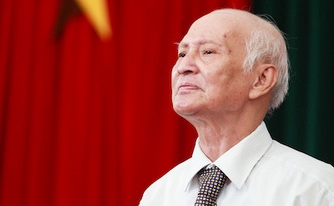
I only really had the chance to study with Mr. Nguyen Kim Dinh for the first time after the liberation of the South, when I left the army and returned to the lecture hall to study with the 18th course. At that time, he was about 40 years old, a bit thin (his body was like that, although in those years, there were few people who were not thin!). But under the brim of his felt cap (as I later learned, having followed him for many years, since the days in Moscow) were bright eyes that were always directed at the person he was talking to, both encouraging and waiting for something. In particular, every time he took off his cap, his broad forehead not only gave an outward impression ofget aheadtime but also made his kind face shine with intelligence. Indeed, his lectures on M. Gorky, V. Mayakovsky... went beyond the limits of the rare textbooks of that time (it seemed that there were only 2 main books in the library: one by V. Nubarov - a visiting professor at Hanoi University in the second half of the 1950s and one by Professor Hoang Xuan Nhi). There, in his lectures, we not only found new knowledge but also felt the desire to "bring the rays of the sun into the human blood" and the excitement of "implementing the resolution of the heart", declaring war on "Soviet vulgarity" of those writers. Later, when I was close to him, continued to study and teach with him in the same subject, I gradually understood the origin of the voice that was both passionate, passionate, and yet firm and concise in his lectures and research works.
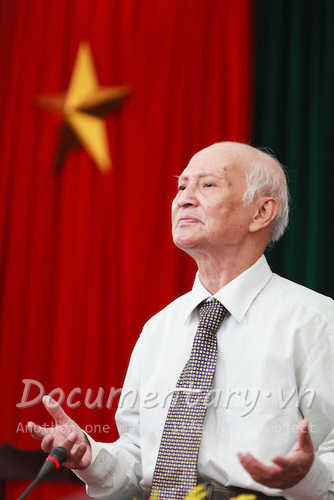
Professor, People's Teacher Nguyen Kim Dinh was Head of the Department of Foreign Literature (1984-1992), Head of the Faculty of Philology (1988-1991) of Hanoi National University/Photo: Thanh Long.
Anyone who has read all, or most of the research works of the teacher himself or under his direction - about thirty articles, books, scientific research topics (a number that is not really "eye-catching" for those who like statistics), can probably share with me the first impression of a writer who is always bold.get aheadand attract colleagues and students to "plunge into" current academic issues in literary research such as typology, poetics, semiotics, narratology, and cultural studies. Only through works published in the Literary Journal -Some poetic problems of linguistic art(1985),On the tendency of independent literary research(1993),Russian philologists and literary semiotics(1995), published in the proceedings of the national conference on New Poetry –Feeling the artistic space in New Poetry(in the book)Looking back at a revolution in poetry,1993), or through ministerial-level research topicsNarrative Dialect Problems(1998), to me, the image of the Teacher, if "looked at from the side", is very sharp. In the chronology of the Faculty of Literature, Hanoi University of Science, it can be said without fear that the scientific events in which he actively participated in, related to the above issues, were not limited to the scope of influence in an academic unit. For example, at the 1980 scientific conference (held at 19 Le Thanh Tong, I do not remember the exact name) on theoretical and practical issues in literary research, with the participation of scholars from the Institute of Literature and Hanoi Pedagogical University, the paperSome issues on typological research methodsThe teacher's work convinced the audience not only by the clarity of the theoretical conclusions for a rather new problem at that time, but also by the careful attitude of filtering and respectfully acknowledging the practical research results of his colleagues, even though they were not really conscious of applying this method. I want to talk about Volume II of the literary history workVietnamese literature 10th century first half of 18th century(University and Vocational High School Publishing House, 1979) compiled by Professor Bui Duy Tan (in the 2-volume textbook series by authors Dinh Gia Khanh, Mai Cao Chuong, Bui Duy Tan) was mentioned by the teacher in the paper, in which the author of the book, according to the teacher, also relied on the principle of "community of types" to distinguish the trends and genres of the period from the 16th century to the first half of the 18th century. I was also very impressed by the mutual respect of the teachers in the Faculty when on the sidelines of that conference, in response to my greeting, Professor of Linguistics Nguyen Tai Can said that he came to the conference "in order to listen to Mr. Dinh's lecture". Later, that paper was developed by the teacher into a teaching topic for many years at the postgraduate level. Looking at the "system" of theoretical research and literary criticism in the following years, I kept thinking that it was probably not a coincidence that after the teacher's summative and suggestive articles, along with the works of professors of the same generation as him such as Mr. Do Duc Hieu and Mr. Tran Dinh Huou, there appeared a number of notable articles/books by students close to the teacher, for example, on Lai Nguyen An's typology (Try to find out the type of motifs in modern Vietnamese literature,Literature Magazine, 1987, No. 6) and Tran Ngoc Vuong (Confucian scholars and Vietnamese literature. Education Publishing House, 1995), on the poetics of Nguyen Xuan Kinh (Poetics of folk songs,Hanoi National University Publishing House, 2004), etc.
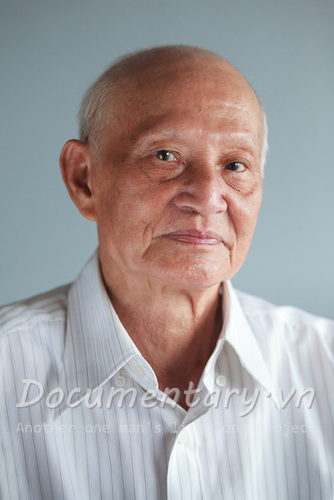
He is an expert on Russian culture and literature/Photo: Jackie Chan
But when talking about Professor Nguyen Kim Dinh, first of all, we are talking about a Russian scholar. He belonged to the first generation of Russian scholars who received basic training. Right after graduating from the first class of the Faculty of Literature of Hanoi University, in 1959, he was sent to study in the Soviet Union. After four years of internship at the Faculty of Philology of Moscow State University, he was taught by famous professors and experts in Russian literature such as AVAlpatov, AIMetchenko, GNPospelov, ... when he returned to the country, he focused on researching and teaching Russian literature until his retirement in 2001. His first monograph on the Soviet Russian writer Maxim Gorky, 293 pages long, was published in 1981. After the bookM. Gorky – Life and careerby Professor Hoang Xuan Nhi written 22 years earlier (1959), this monograph gives us a deeper and more vivid understanding of Gorky - the "storm bird" of the revolution, the "apostle" of socialism, the creator of the "myth of the man with the wings of Icarus". Of course, time has allowed his successors in the work of teaching and researching Russian Literature to introduce another face of Gorky - one of the great and complex phenomena of world literature. However, I still think that his book can be used as an object for practicing genre analysis.creative portrait criticismin subjectArt theory and criticismof the current training program for students majoring in Literature.
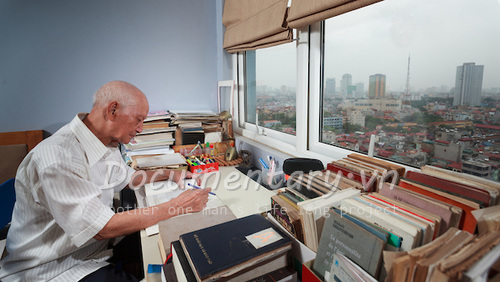
Professor, People's Teacher Nguyen Kim Dinh at his home in 2012/Photo: Thanh Long
Like most people who studied literature in Russia during the Soviet period, his attachment to Russia is not only due to the beautiful impressions or memories of the nature and people of the birch country, but also due to the noble humanistic ideals, full of vitality in the immortal literary images of classical Russian writers.
As the son of a famous teacher in Thanh Hoa, originally from Nghe An, he himself had studied Chinese characters since childhood, received a Diploma at Dao Duy Tu School, at the same time as his supervisor, Professor Tran Dinh Huou, and had taught high school (math!) for 4 years in Quang Xuong, before he entered the first course of Hanoi University. A few "short excerpts" like that are to be able to imagine the "receptiveness" of Russian literature/culture of readers - Nguyen Kim Dinh. And only with such "receptiveness" can one have enough courage to adapt to the changes of the times while remaining loyal to the field of Russian studies. Remember, in the early 90s of the last century, after the collapse of the Soviet Union, there were a few "Russian scholars" who quickly changed their decades-long belief in the (true) values of Soviet literature, becoming or struggling to become another "house". As for the loyal reader Nguyen Kim Dinh, reading is not only about perception but also/must be accompanied by creativity, creativity in a unique, personal sense, in some aspect. Perhaps that is why recently, in meetings between Russian scholars, when participating in professional councils evaluating doctoral theses or considering state awards, he often said that "we learn a lot but do not do much". That is a reality. But there is also another reality that Associate Professor Dao Tuan Anh, a close colleague of our teacher and students, mentioned at that time: "We can be sad because we have not done much but we can rest assured because the things we do are not "market goods!". As for me, in those words of the teacher, I read not only a bit of regret but also the desire to reach new goals in the relay race of generations of Russian scholars in our country.
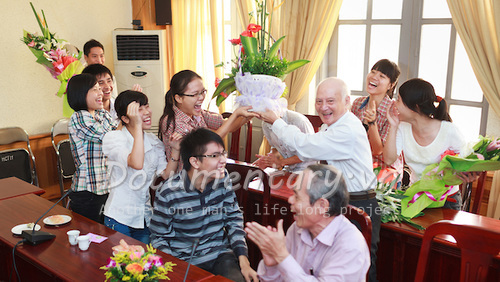
Professor, People's Teacher Nguyen Kim Dinh and students of Literature/Photo: Thanh Long
Among the many things he shared with me during our years of working together, there are two things I often share with my students whenever I mention him as a mentor. The first thing is the requirement for a foundation of professional knowledge. He told me in the first meeting, when I became his colleague: "To teach and research well, you must first be good at foreign languages and have a firm grasp of literary theory". Perhaps among my fellow students and colleagues, I was lucky to have someone who guided me and was willing to share about my expertise right from the time I became a lecturer (he often jokingly said that "feel free to exploit" him as much as possible). The second thing is the moral responsibility of a teacher, which he talked about in the way of "literary people". That was once, more than 20 years ago, when talking about some "deviant" phenomena in the teacher-student relationship, he repeated two lines of poetry by the Soviet poet Nikolai Sidorenko that he really liked:
Sing whatever you want, do whatever you want
But don't dirty the first snowflakes of the season.
“First snow of the season”of each person - it is a symbol of purity, sacredness: "first kiss, first battle" (E. Evtusshenko), the first blank page in the notebook of life... I always believe that the teaching profession is to help each person preserve those noble values throughout their life.
His life of “learning without boredom, teaching without fatigue” was closely linked to words. On the occasion of his seventy-fifth birthday, my friends and I presented him with a calligraphy piece with four words:Don Hau Bac Van.
|
PROFESSOR, PEOPLE'S TEACHER NGUYEN KIM DINH
+ Working unit: Faculty of Philology (Hanoi University of Science). + Management position: Head of Foreign Literature Department (1984-1992). Deputy Head of Department of Literature (1987). Head of the Department of Literature (1988-1991).
History of Russian Literature(co-written, co-edited with Associate Professor Do Hong Chung), University and Vocational High School Publishing House, 1998. History of Soviet literature(co-author, co-editor), University and Vocational High School Publishing House 1982,1985. Maxim Gorky,Culture Publishing House, 1981. Dictionary of Literature(co-authored), Social Sciences Publishing House 1983,1993. Pushkin on the threshold of the 21st century(co-author), Information Publishing House, 2002. |
Author:Assoc.Prof.Dr. Pham Gia Lam